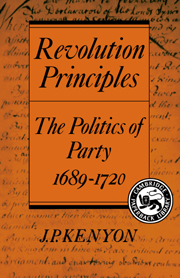Book contents
- Frontmatter
- Contents
- Preface
- Preface to the paperback edition (1990)
- 1 Introduction
- 2 By force or by miracle
- 3 The measure of submission
- 4 This skein of tangled principles
- 5 King Charles's head
- 6 The bloody flag
- 7 Revolution Principles
- 8 Black and odious colours
- 9 The four last years
- 10 That triumphant appellation
- 11 Conclusion
- Appendix
- Abbreviations
- Notes
- Addendum
- Index
Appendix
Vox Populi Vox Dei
Published online by Cambridge University Press: 07 October 2009
- Frontmatter
- Contents
- Preface
- Preface to the paperback edition (1990)
- 1 Introduction
- 2 By force or by miracle
- 3 The measure of submission
- 4 This skein of tangled principles
- 5 King Charles's head
- 6 The bloody flag
- 7 Revolution Principles
- 8 Black and odious colours
- 9 The four last years
- 10 That triumphant appellation
- 11 Conclusion
- Appendix
- Abbreviations
- Notes
- Addendum
- Index
Summary
The author of Vox Populi Vox Dei is unknown. Some nineteenth-century bibliographers gave the honour to Somers, others to Defoe, but neither attribution is very plausible. It seems unlikely that the veteran Lord President ventured into party polemics again at this stage of his career, and contemporaries do not seem to have attributed the pamphlet to him as they did Anguis in Herba (1701) or Jura Populi Anglicani (1701). Defoe is a more plausible possibility, but no more than that; VPVD is not really extreme enough for him, when we consider what he was writing between 1706 and 1709, and the style is not his.
An exact attribution is made more difficult by the fact that the pamphlet swelled from edition to edition, until the third edition of 1710, under the title The Judgment of Whole Kingdoms… was nearly twice the length of the original. But these later editions do purport to offer some clues to the author's identity. Thus the tide-page of the first edition of the pamphlet under its new name identifies him as ‘a true lover of the queen and country, who wrote in the year 1690…in a challenge to Sir R. L'Estrange, Dr Sherlock and eleven other divines’. Obviously, this refers to Political Aphorisms; or The True Maxims of Government (1690), which had as a subtitle ‘By way of challenge to Dr William Sherlock, and ten other new Protestant Dissenters’.
- Type
- Chapter
- Information
- Revolution PrinciplesThe Politics of Party 1689–1720, pp. 209 - 210Publisher: Cambridge University PressPrint publication year: 1977

